Cross-Cultural Communication and Business Expansion: A Case Study
VerifiedAdded on 2023/01/16
|11
|2392
|1
Essay
AI Summary
This essay delves into the crucial role of cross-cultural communication in the context of international business expansion. It begins by highlighting the significance of understanding cultural differences in a globalized world, using the example of an Australian entrepreneur, Mary, seeking to expand her condiment business to Japan. The essay emphasizes the importance of adapting to Japanese business etiquette and protocols, particularly when meeting with Mr. Moro, a manager in Tokyo. It then applies Hofstede's cultural dimensions framework to analyze the cultural dynamics between Australia and Japan, identifying key differences in power distance, individualism, uncertainty avoidance, masculinity, and long-term orientation. Finally, the essay offers practical recommendations for Mary to increase her chances of success, emphasizing the need to demonstrate dedication, respect hierarchical structures, and avoid actions considered unacceptable within Japanese business culture. The essay concludes by reiterating the critical need for cross-cultural understanding to achieve business goals in international settings.
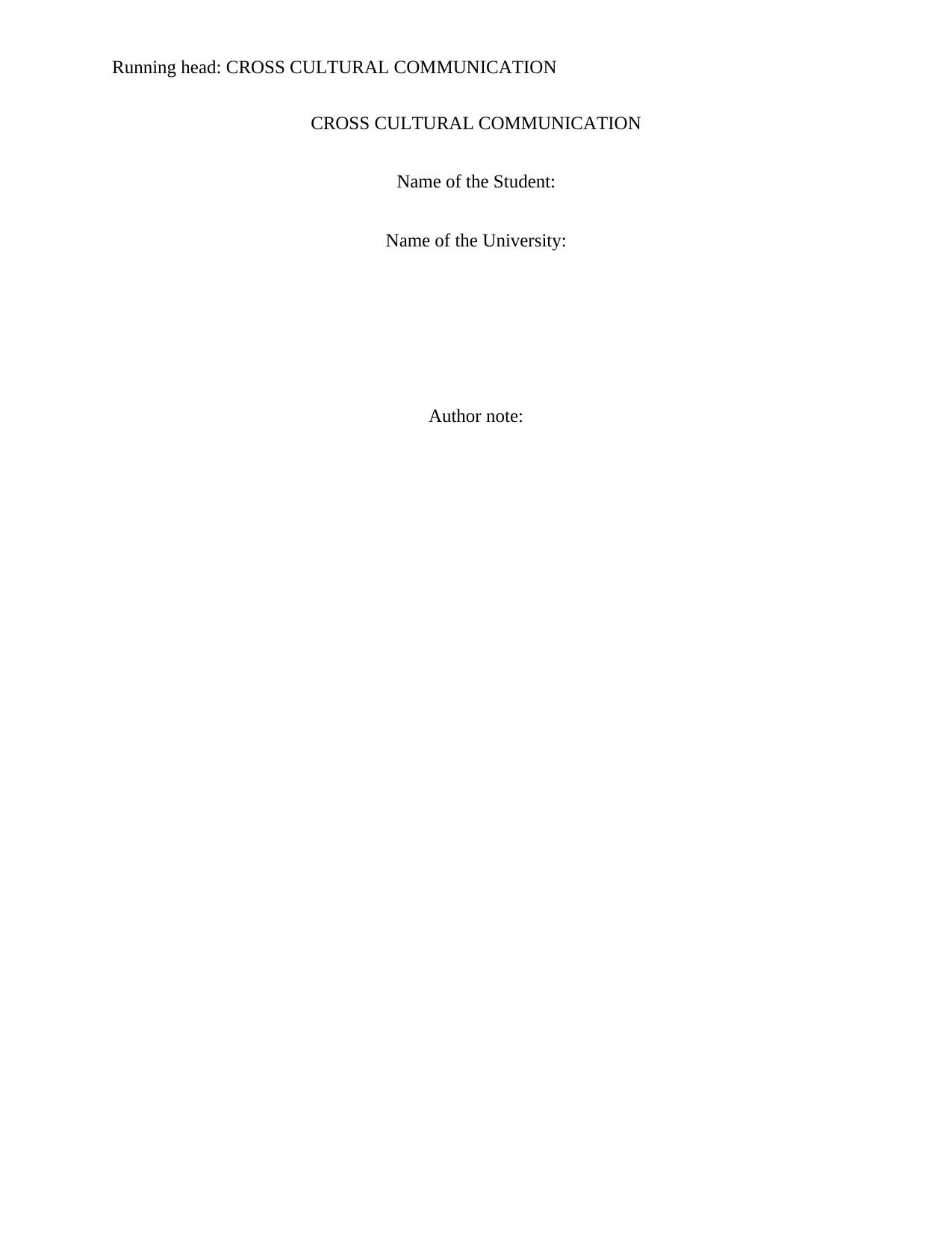
Running head: CROSS CULTURAL COMMUNICATION
CROSS CULTURAL COMMUNICATION
Name of the Student:
Name of the University:
Author note:
CROSS CULTURAL COMMUNICATION
Name of the Student:
Name of the University:
Author note:
Paraphrase This Document
Need a fresh take? Get an instant paraphrase of this document with our AI Paraphraser
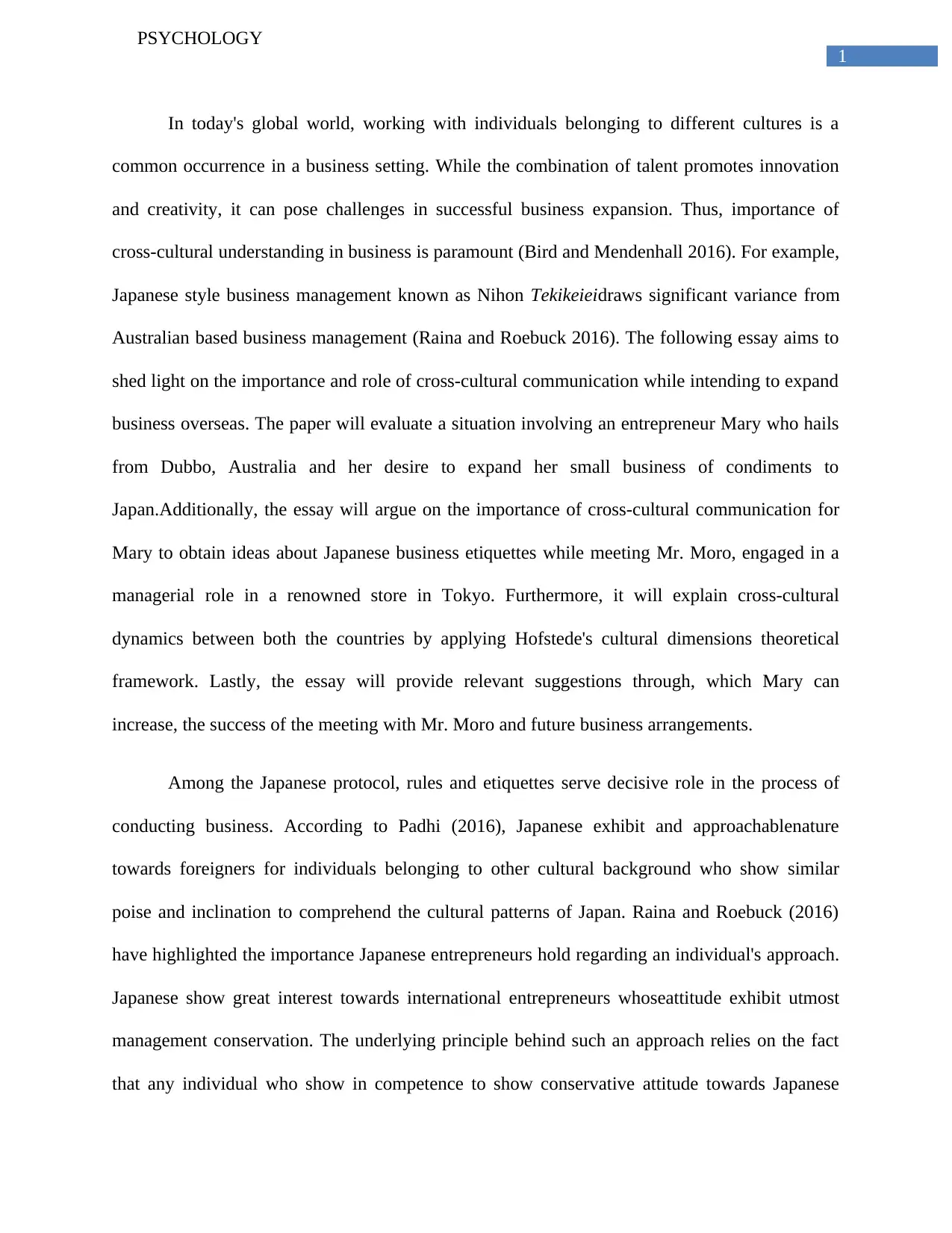
1
PSYCHOLOGY
In today's global world, working with individuals belonging to different cultures is a
common occurrence in a business setting. While the combination of talent promotes innovation
and creativity, it can pose challenges in successful business expansion. Thus, importance of
cross-cultural understanding in business is paramount (Bird and Mendenhall 2016). For example,
Japanese style business management known as Nihon Tekikeieidraws significant variance from
Australian based business management (Raina and Roebuck 2016). The following essay aims to
shed light on the importance and role of cross-cultural communication while intending to expand
business overseas. The paper will evaluate a situation involving an entrepreneur Mary who hails
from Dubbo, Australia and her desire to expand her small business of condiments to
Japan.Additionally, the essay will argue on the importance of cross-cultural communication for
Mary to obtain ideas about Japanese business etiquettes while meeting Mr. Moro, engaged in a
managerial role in a renowned store in Tokyo. Furthermore, it will explain cross-cultural
dynamics between both the countries by applying Hofstede's cultural dimensions theoretical
framework. Lastly, the essay will provide relevant suggestions through, which Mary can
increase, the success of the meeting with Mr. Moro and future business arrangements.
Among the Japanese protocol, rules and etiquettes serve decisive role in the process of
conducting business. According to Padhi (2016), Japanese exhibit and approachablenature
towards foreigners for individuals belonging to other cultural background who show similar
poise and inclination to comprehend the cultural patterns of Japan. Raina and Roebuck (2016)
have highlighted the importance Japanese entrepreneurs hold regarding an individual's approach.
Japanese show great interest towards international entrepreneurs whoseattitude exhibit utmost
management conservation. The underlying principle behind such an approach relies on the fact
that any individual who show in competence to show conservative attitude towards Japanese
PSYCHOLOGY
In today's global world, working with individuals belonging to different cultures is a
common occurrence in a business setting. While the combination of talent promotes innovation
and creativity, it can pose challenges in successful business expansion. Thus, importance of
cross-cultural understanding in business is paramount (Bird and Mendenhall 2016). For example,
Japanese style business management known as Nihon Tekikeieidraws significant variance from
Australian based business management (Raina and Roebuck 2016). The following essay aims to
shed light on the importance and role of cross-cultural communication while intending to expand
business overseas. The paper will evaluate a situation involving an entrepreneur Mary who hails
from Dubbo, Australia and her desire to expand her small business of condiments to
Japan.Additionally, the essay will argue on the importance of cross-cultural communication for
Mary to obtain ideas about Japanese business etiquettes while meeting Mr. Moro, engaged in a
managerial role in a renowned store in Tokyo. Furthermore, it will explain cross-cultural
dynamics between both the countries by applying Hofstede's cultural dimensions theoretical
framework. Lastly, the essay will provide relevant suggestions through, which Mary can
increase, the success of the meeting with Mr. Moro and future business arrangements.
Among the Japanese protocol, rules and etiquettes serve decisive role in the process of
conducting business. According to Padhi (2016), Japanese exhibit and approachablenature
towards foreigners for individuals belonging to other cultural background who show similar
poise and inclination to comprehend the cultural patterns of Japan. Raina and Roebuck (2016)
have highlighted the importance Japanese entrepreneurs hold regarding an individual's approach.
Japanese show great interest towards international entrepreneurs whoseattitude exhibit utmost
management conservation. The underlying principle behind such an approach relies on the fact
that any individual who show in competence to show conservative attitude towards Japanese
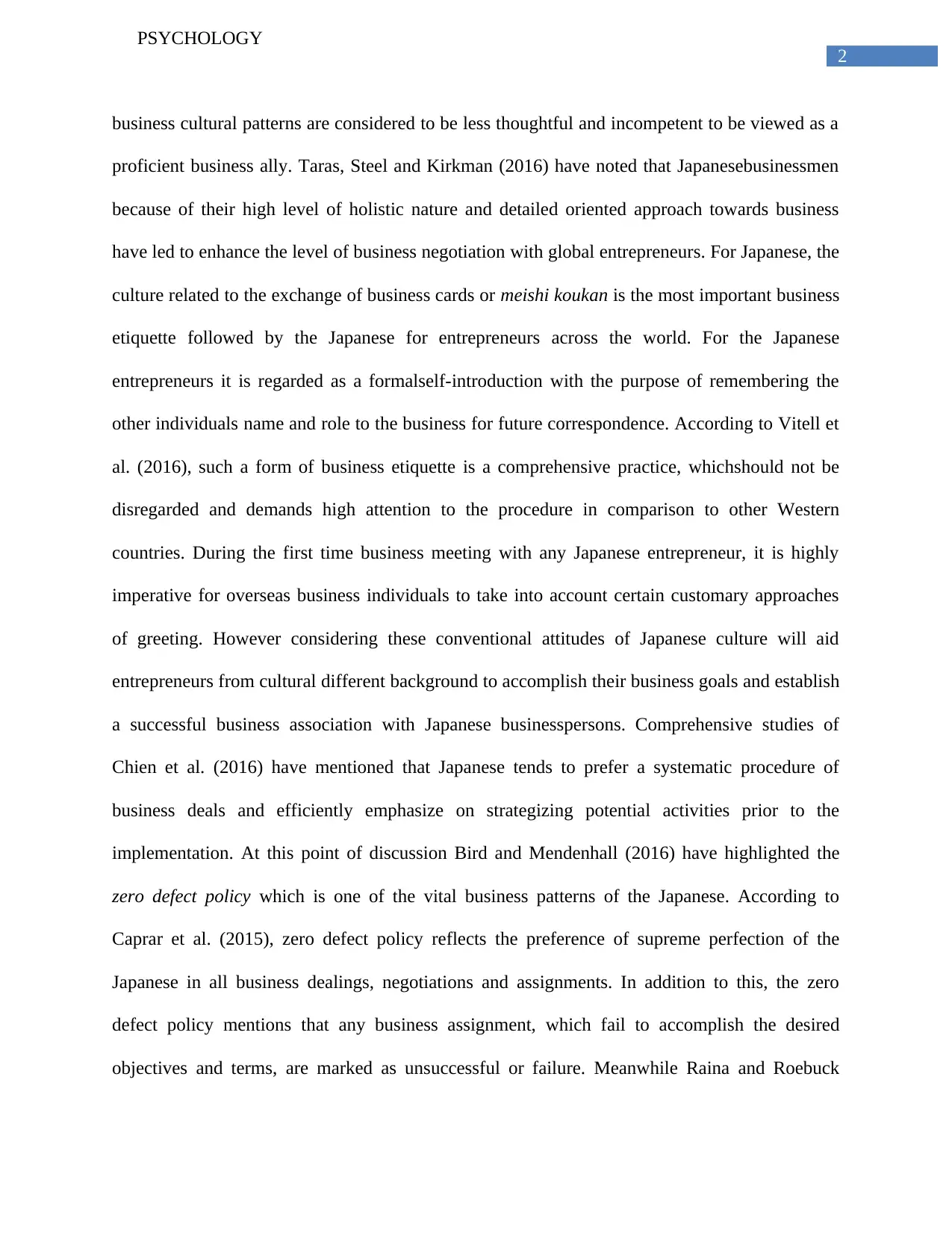
2
PSYCHOLOGY
business cultural patterns are considered to be less thoughtful and incompetent to be viewed as a
proficient business ally. Taras, Steel and Kirkman (2016) have noted that Japanesebusinessmen
because of their high level of holistic nature and detailed oriented approach towards business
have led to enhance the level of business negotiation with global entrepreneurs. For Japanese, the
culture related to the exchange of business cards or meishi koukan is the most important business
etiquette followed by the Japanese for entrepreneurs across the world. For the Japanese
entrepreneurs it is regarded as a formalself-introduction with the purpose of remembering the
other individuals name and role to the business for future correspondence. According to Vitell et
al. (2016), such a form of business etiquette is a comprehensive practice, whichshould not be
disregarded and demands high attention to the procedure in comparison to other Western
countries. During the first time business meeting with any Japanese entrepreneur, it is highly
imperative for overseas business individuals to take into account certain customary approaches
of greeting. However considering these conventional attitudes of Japanese culture will aid
entrepreneurs from cultural different background to accomplish their business goals and establish
a successful business association with Japanese businesspersons. Comprehensive studies of
Chien et al. (2016) have mentioned that Japanese tends to prefer a systematic procedure of
business deals and efficiently emphasize on strategizing potential activities prior to the
implementation. At this point of discussion Bird and Mendenhall (2016) have highlighted the
zero defect policy which is one of the vital business patterns of the Japanese. According to
Caprar et al. (2015), zero defect policy reflects the preference of supreme perfection of the
Japanese in all business dealings, negotiations and assignments. In addition to this, the zero
defect policy mentions that any business assignment, which fail to accomplish the desired
objectives and terms, are marked as unsuccessful or failure. Meanwhile Raina and Roebuck
PSYCHOLOGY
business cultural patterns are considered to be less thoughtful and incompetent to be viewed as a
proficient business ally. Taras, Steel and Kirkman (2016) have noted that Japanesebusinessmen
because of their high level of holistic nature and detailed oriented approach towards business
have led to enhance the level of business negotiation with global entrepreneurs. For Japanese, the
culture related to the exchange of business cards or meishi koukan is the most important business
etiquette followed by the Japanese for entrepreneurs across the world. For the Japanese
entrepreneurs it is regarded as a formalself-introduction with the purpose of remembering the
other individuals name and role to the business for future correspondence. According to Vitell et
al. (2016), such a form of business etiquette is a comprehensive practice, whichshould not be
disregarded and demands high attention to the procedure in comparison to other Western
countries. During the first time business meeting with any Japanese entrepreneur, it is highly
imperative for overseas business individuals to take into account certain customary approaches
of greeting. However considering these conventional attitudes of Japanese culture will aid
entrepreneurs from cultural different background to accomplish their business goals and establish
a successful business association with Japanese businesspersons. Comprehensive studies of
Chien et al. (2016) have mentioned that Japanese tends to prefer a systematic procedure of
business deals and efficiently emphasize on strategizing potential activities prior to the
implementation. At this point of discussion Bird and Mendenhall (2016) have highlighted the
zero defect policy which is one of the vital business patterns of the Japanese. According to
Caprar et al. (2015), zero defect policy reflects the preference of supreme perfection of the
Japanese in all business dealings, negotiations and assignments. In addition to this, the zero
defect policy mentions that any business assignment, which fail to accomplish the desired
objectives and terms, are marked as unsuccessful or failure. Meanwhile Raina and Roebuck
⊘ This is a preview!⊘
Do you want full access?
Subscribe today to unlock all pages.

Trusted by 1+ million students worldwide
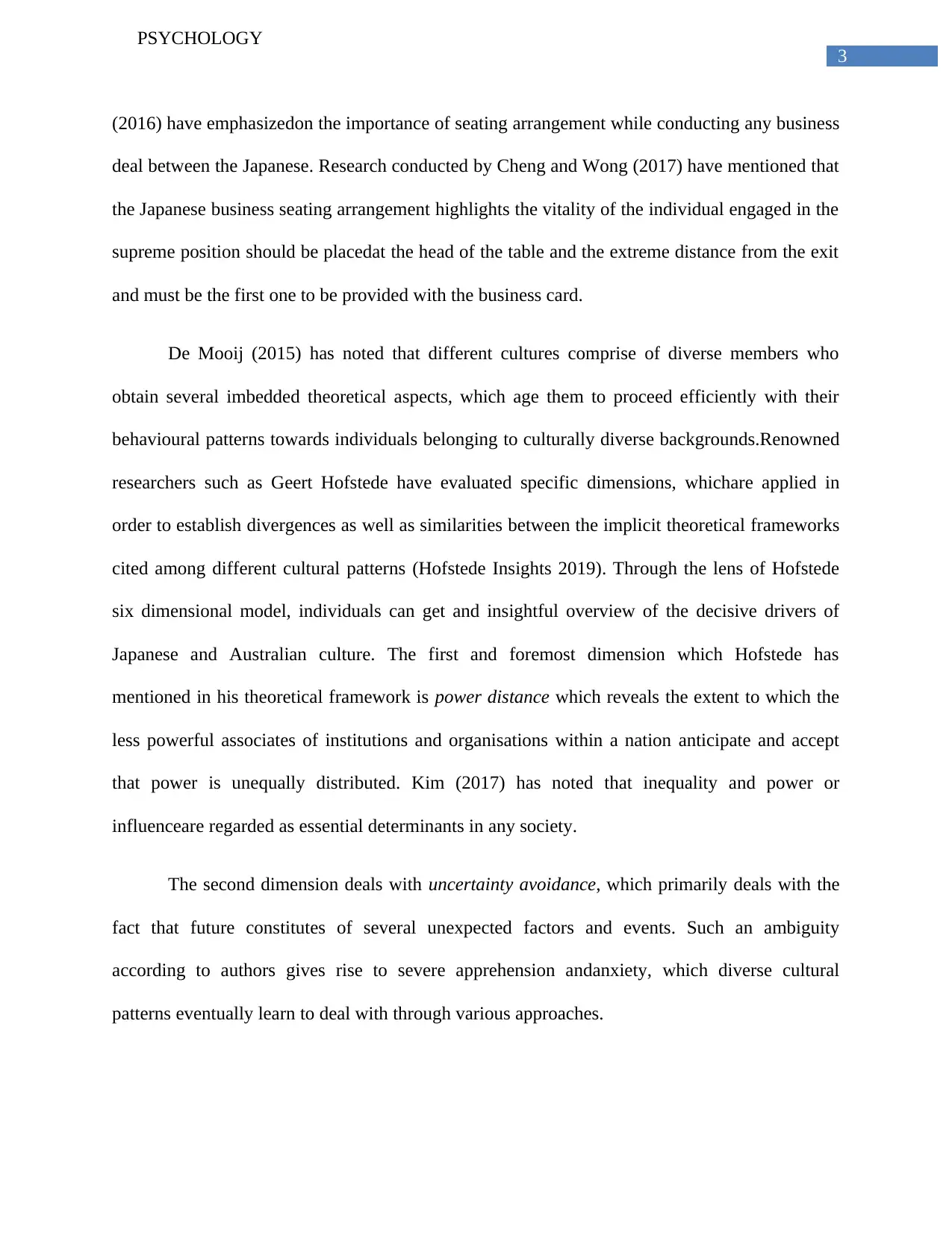
3
PSYCHOLOGY
(2016) have emphasizedon the importance of seating arrangement while conducting any business
deal between the Japanese. Research conducted by Cheng and Wong (2017) have mentioned that
the Japanese business seating arrangement highlights the vitality of the individual engaged in the
supreme position should be placedat the head of the table and the extreme distance from the exit
and must be the first one to be provided with the business card.
De Mooij (2015) has noted that different cultures comprise of diverse members who
obtain several imbedded theoretical aspects, which age them to proceed efficiently with their
behavioural patterns towards individuals belonging to culturally diverse backgrounds.Renowned
researchers such as Geert Hofstede have evaluated specific dimensions, whichare applied in
order to establish divergences as well as similarities between the implicit theoretical frameworks
cited among different cultural patterns (Hofstede Insights 2019). Through the lens of Hofstede
six dimensional model, individuals can get and insightful overview of the decisive drivers of
Japanese and Australian culture. The first and foremost dimension which Hofstede has
mentioned in his theoretical framework is power distance which reveals the extent to which the
less powerful associates of institutions and organisations within a nation anticipate and accept
that power is unequally distributed. Kim (2017) has noted that inequality and power or
influenceare regarded as essential determinants in any society.
The second dimension deals with uncertainty avoidance, which primarily deals with the
fact that future constitutes of several unexpected factors and events. Such an ambiguity
according to authors gives rise to severe apprehension andanxiety, which diverse cultural
patterns eventually learn to deal with through various approaches.
PSYCHOLOGY
(2016) have emphasizedon the importance of seating arrangement while conducting any business
deal between the Japanese. Research conducted by Cheng and Wong (2017) have mentioned that
the Japanese business seating arrangement highlights the vitality of the individual engaged in the
supreme position should be placedat the head of the table and the extreme distance from the exit
and must be the first one to be provided with the business card.
De Mooij (2015) has noted that different cultures comprise of diverse members who
obtain several imbedded theoretical aspects, which age them to proceed efficiently with their
behavioural patterns towards individuals belonging to culturally diverse backgrounds.Renowned
researchers such as Geert Hofstede have evaluated specific dimensions, whichare applied in
order to establish divergences as well as similarities between the implicit theoretical frameworks
cited among different cultural patterns (Hofstede Insights 2019). Through the lens of Hofstede
six dimensional model, individuals can get and insightful overview of the decisive drivers of
Japanese and Australian culture. The first and foremost dimension which Hofstede has
mentioned in his theoretical framework is power distance which reveals the extent to which the
less powerful associates of institutions and organisations within a nation anticipate and accept
that power is unequally distributed. Kim (2017) has noted that inequality and power or
influenceare regarded as essential determinants in any society.
The second dimension deals with uncertainty avoidance, which primarily deals with the
fact that future constitutes of several unexpected factors and events. Such an ambiguity
according to authors gives rise to severe apprehension andanxiety, which diverse cultural
patterns eventually learn to deal with through various approaches.
Paraphrase This Document
Need a fresh take? Get an instant paraphrase of this document with our AI Paraphraser
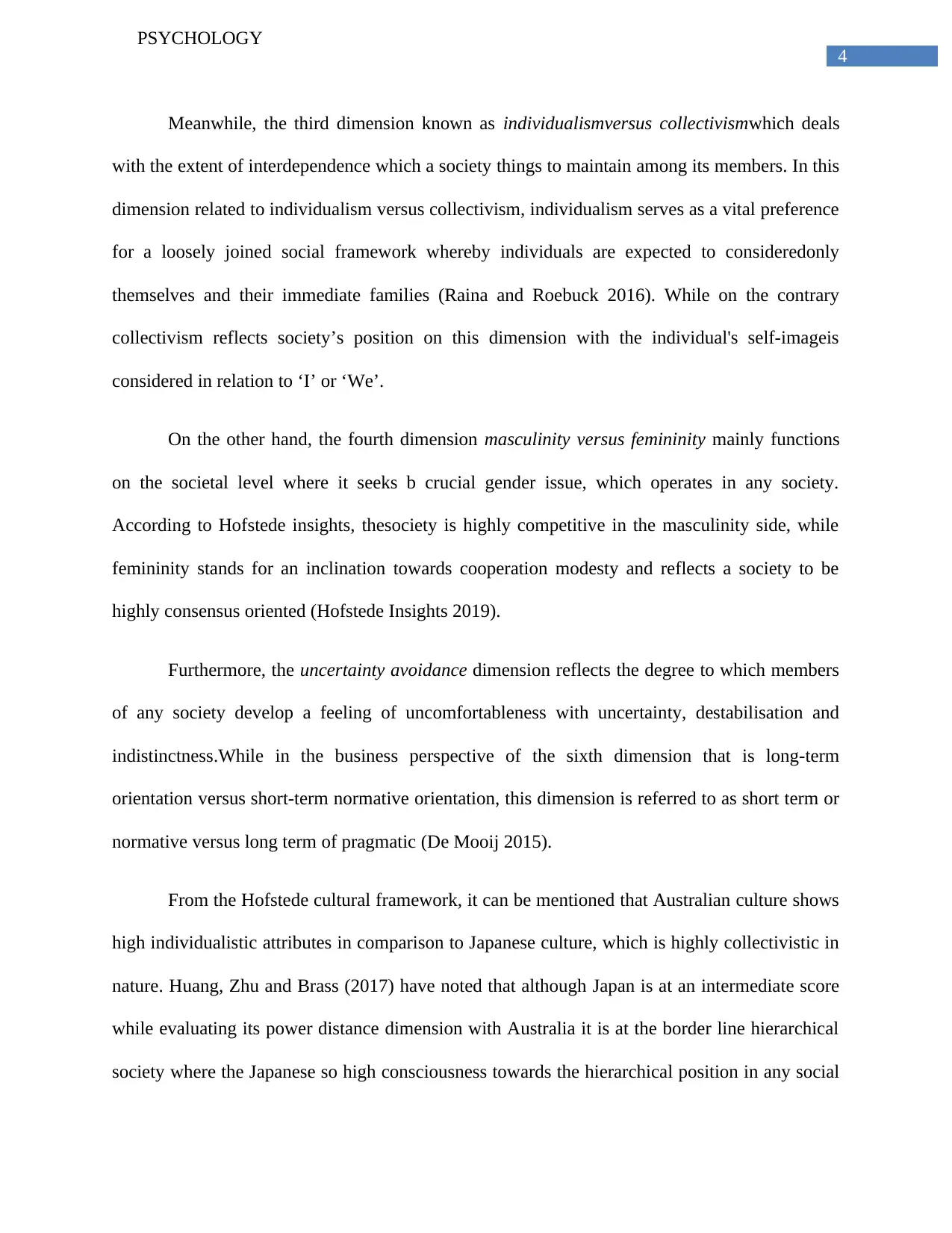
4
PSYCHOLOGY
Meanwhile, the third dimension known as individualismversus collectivismwhich deals
with the extent of interdependence which a society things to maintain among its members. In this
dimension related to individualism versus collectivism, individualism serves as a vital preference
for a loosely joined social framework whereby individuals are expected to consideredonly
themselves and their immediate families (Raina and Roebuck 2016). While on the contrary
collectivism reflects society’s position on this dimension with the individual's self-imageis
considered in relation to ‘I’ or ‘We’.
On the other hand, the fourth dimension masculinity versus femininity mainly functions
on the societal level where it seeks b crucial gender issue, which operates in any society.
According to Hofstede insights, thesociety is highly competitive in the masculinity side, while
femininity stands for an inclination towards cooperation modesty and reflects a society to be
highly consensus oriented (Hofstede Insights 2019).
Furthermore, the uncertainty avoidance dimension reflects the degree to which members
of any society develop a feeling of uncomfortableness with uncertainty, destabilisation and
indistinctness.While in the business perspective of the sixth dimension that is long-term
orientation versus short-term normative orientation, this dimension is referred to as short term or
normative versus long term of pragmatic (De Mooij 2015).
From the Hofstede cultural framework, it can be mentioned that Australian culture shows
high individualistic attributes in comparison to Japanese culture, which is highly collectivistic in
nature. Huang, Zhu and Brass (2017) have noted that although Japan is at an intermediate score
while evaluating its power distance dimension with Australia it is at the border line hierarchical
society where the Japanese so high consciousness towards the hierarchical position in any social
PSYCHOLOGY
Meanwhile, the third dimension known as individualismversus collectivismwhich deals
with the extent of interdependence which a society things to maintain among its members. In this
dimension related to individualism versus collectivism, individualism serves as a vital preference
for a loosely joined social framework whereby individuals are expected to consideredonly
themselves and their immediate families (Raina and Roebuck 2016). While on the contrary
collectivism reflects society’s position on this dimension with the individual's self-imageis
considered in relation to ‘I’ or ‘We’.
On the other hand, the fourth dimension masculinity versus femininity mainly functions
on the societal level where it seeks b crucial gender issue, which operates in any society.
According to Hofstede insights, thesociety is highly competitive in the masculinity side, while
femininity stands for an inclination towards cooperation modesty and reflects a society to be
highly consensus oriented (Hofstede Insights 2019).
Furthermore, the uncertainty avoidance dimension reflects the degree to which members
of any society develop a feeling of uncomfortableness with uncertainty, destabilisation and
indistinctness.While in the business perspective of the sixth dimension that is long-term
orientation versus short-term normative orientation, this dimension is referred to as short term or
normative versus long term of pragmatic (De Mooij 2015).
From the Hofstede cultural framework, it can be mentioned that Australian culture shows
high individualistic attributes in comparison to Japanese culture, which is highly collectivistic in
nature. Huang, Zhu and Brass (2017) have noted that although Japan is at an intermediate score
while evaluating its power distance dimension with Australia it is at the border line hierarchical
society where the Japanese so high consciousness towards the hierarchical position in any social
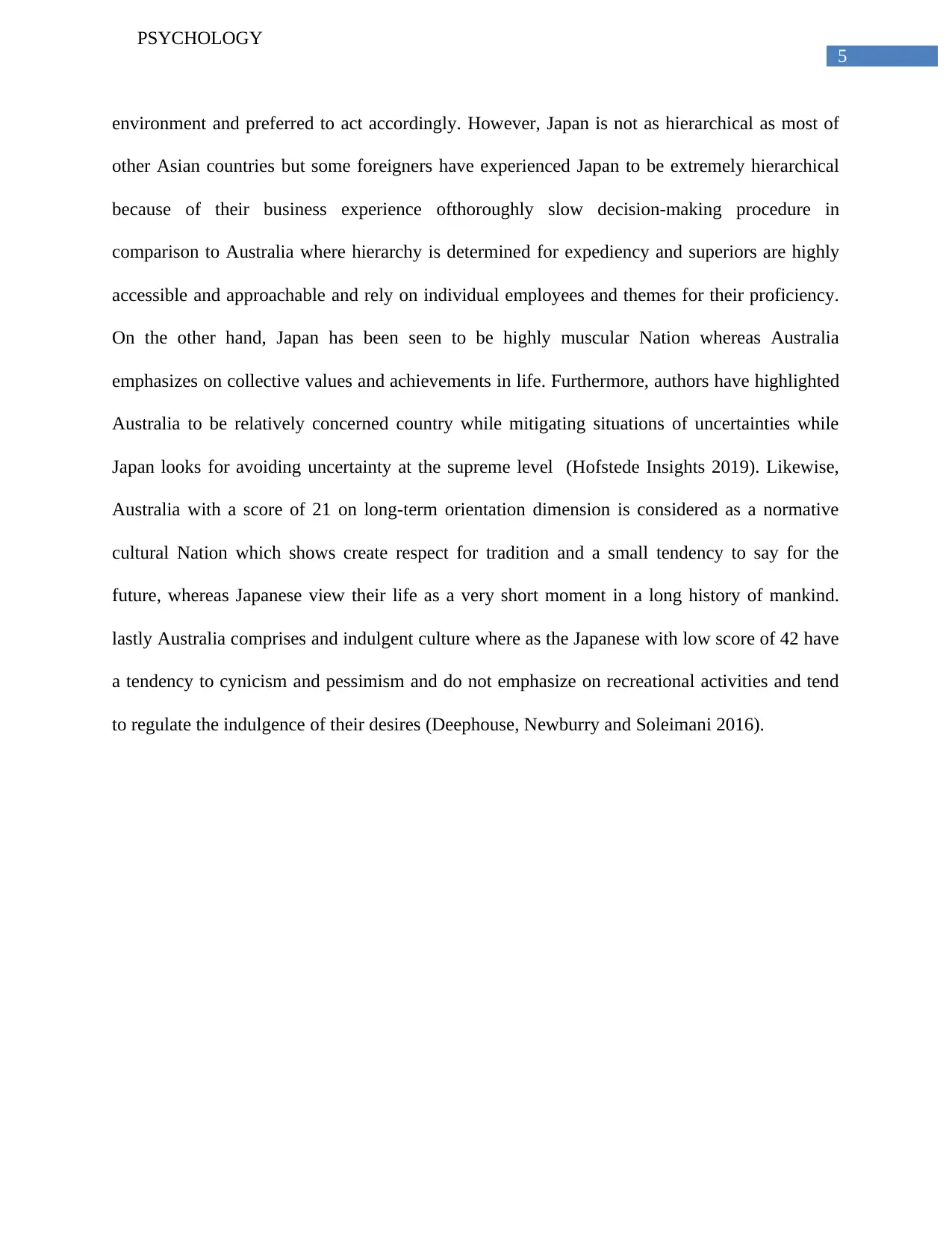
5
PSYCHOLOGY
environment and preferred to act accordingly. However, Japan is not as hierarchical as most of
other Asian countries but some foreigners have experienced Japan to be extremely hierarchical
because of their business experience ofthoroughly slow decision-making procedure in
comparison to Australia where hierarchy is determined for expediency and superiors are highly
accessible and approachable and rely on individual employees and themes for their proficiency.
On the other hand, Japan has been seen to be highly muscular Nation whereas Australia
emphasizes on collective values and achievements in life. Furthermore, authors have highlighted
Australia to be relatively concerned country while mitigating situations of uncertainties while
Japan looks for avoiding uncertainty at the supreme level (Hofstede Insights 2019). Likewise,
Australia with a score of 21 on long-term orientation dimension is considered as a normative
cultural Nation which shows create respect for tradition and a small tendency to say for the
future, whereas Japanese view their life as a very short moment in a long history of mankind.
lastly Australia comprises and indulgent culture where as the Japanese with low score of 42 have
a tendency to cynicism and pessimism and do not emphasize on recreational activities and tend
to regulate the indulgence of their desires (Deephouse, Newburry and Soleimani 2016).
PSYCHOLOGY
environment and preferred to act accordingly. However, Japan is not as hierarchical as most of
other Asian countries but some foreigners have experienced Japan to be extremely hierarchical
because of their business experience ofthoroughly slow decision-making procedure in
comparison to Australia where hierarchy is determined for expediency and superiors are highly
accessible and approachable and rely on individual employees and themes for their proficiency.
On the other hand, Japan has been seen to be highly muscular Nation whereas Australia
emphasizes on collective values and achievements in life. Furthermore, authors have highlighted
Australia to be relatively concerned country while mitigating situations of uncertainties while
Japan looks for avoiding uncertainty at the supreme level (Hofstede Insights 2019). Likewise,
Australia with a score of 21 on long-term orientation dimension is considered as a normative
cultural Nation which shows create respect for tradition and a small tendency to say for the
future, whereas Japanese view their life as a very short moment in a long history of mankind.
lastly Australia comprises and indulgent culture where as the Japanese with low score of 42 have
a tendency to cynicism and pessimism and do not emphasize on recreational activities and tend
to regulate the indulgence of their desires (Deephouse, Newburry and Soleimani 2016).
⊘ This is a preview!⊘
Do you want full access?
Subscribe today to unlock all pages.

Trusted by 1+ million students worldwide
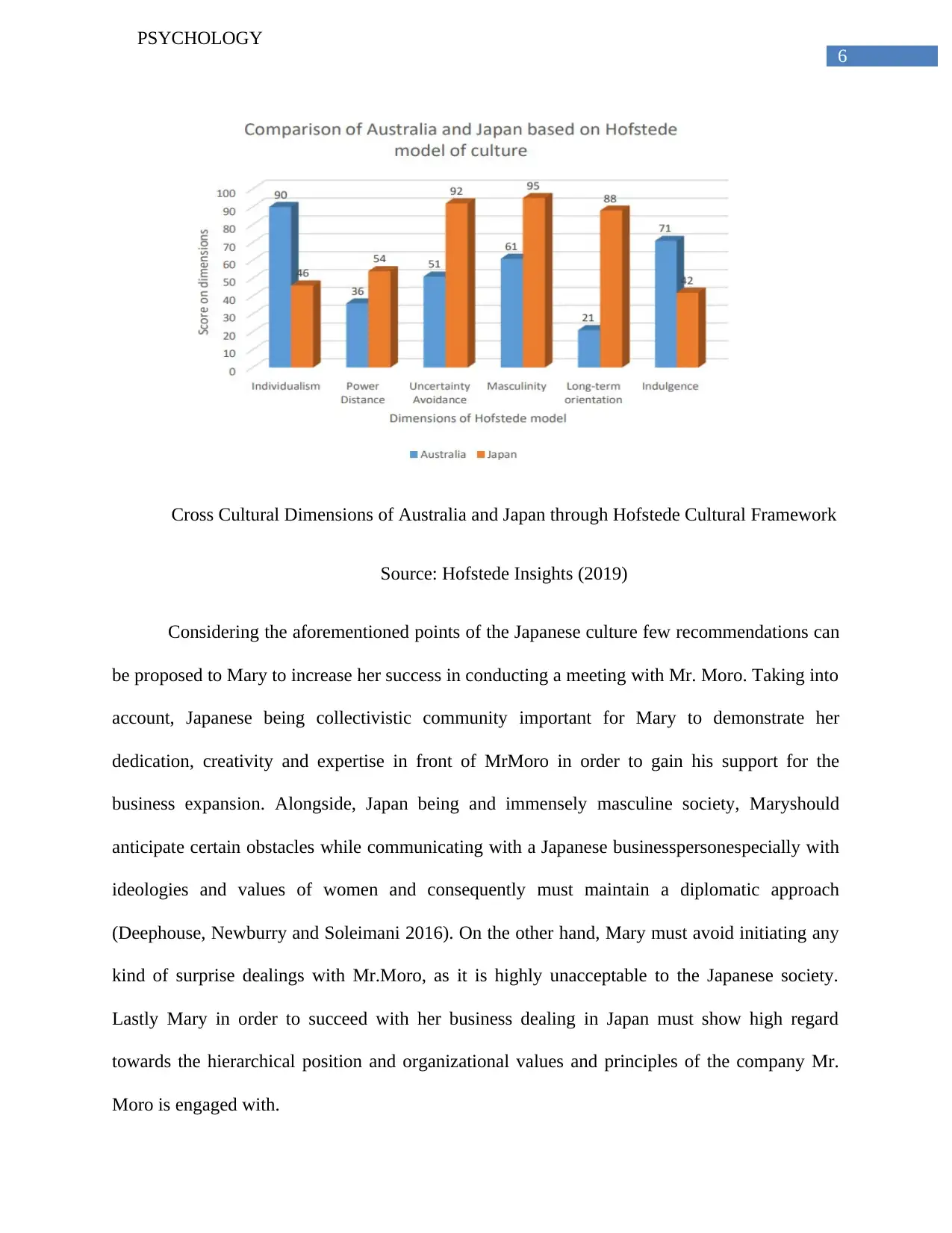
6
PSYCHOLOGY
Cross Cultural Dimensions of Australia and Japan through Hofstede Cultural Framework
Source: Hofstede Insights (2019)
Considering the aforementioned points of the Japanese culture few recommendations can
be proposed to Mary to increase her success in conducting a meeting with Mr. Moro. Taking into
account, Japanese being collectivistic community important for Mary to demonstrate her
dedication, creativity and expertise in front of MrMoro in order to gain his support for the
business expansion. Alongside, Japan being and immensely masculine society, Maryshould
anticipate certain obstacles while communicating with a Japanese businesspersonespecially with
ideologies and values of women and consequently must maintain a diplomatic approach
(Deephouse, Newburry and Soleimani 2016). On the other hand, Mary must avoid initiating any
kind of surprise dealings with Mr.Moro, as it is highly unacceptable to the Japanese society.
Lastly Mary in order to succeed with her business dealing in Japan must show high regard
towards the hierarchical position and organizational values and principles of the company Mr.
Moro is engaged with.
PSYCHOLOGY
Cross Cultural Dimensions of Australia and Japan through Hofstede Cultural Framework
Source: Hofstede Insights (2019)
Considering the aforementioned points of the Japanese culture few recommendations can
be proposed to Mary to increase her success in conducting a meeting with Mr. Moro. Taking into
account, Japanese being collectivistic community important for Mary to demonstrate her
dedication, creativity and expertise in front of MrMoro in order to gain his support for the
business expansion. Alongside, Japan being and immensely masculine society, Maryshould
anticipate certain obstacles while communicating with a Japanese businesspersonespecially with
ideologies and values of women and consequently must maintain a diplomatic approach
(Deephouse, Newburry and Soleimani 2016). On the other hand, Mary must avoid initiating any
kind of surprise dealings with Mr.Moro, as it is highly unacceptable to the Japanese society.
Lastly Mary in order to succeed with her business dealing in Japan must show high regard
towards the hierarchical position and organizational values and principles of the company Mr.
Moro is engaged with.
Paraphrase This Document
Need a fresh take? Get an instant paraphrase of this document with our AI Paraphraser
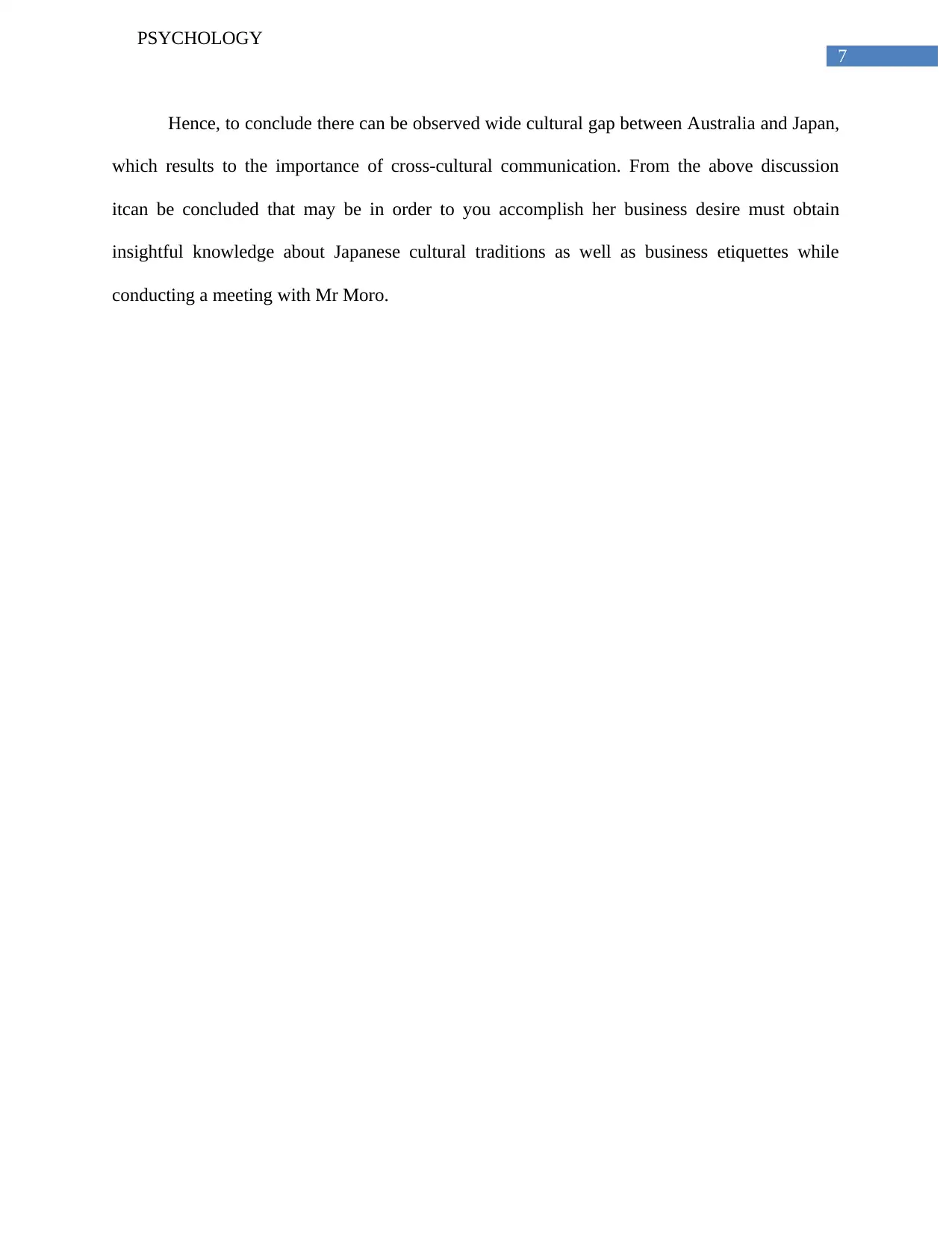
7
PSYCHOLOGY
Hence, to conclude there can be observed wide cultural gap between Australia and Japan,
which results to the importance of cross-cultural communication. From the above discussion
itcan be concluded that may be in order to you accomplish her business desire must obtain
insightful knowledge about Japanese cultural traditions as well as business etiquettes while
conducting a meeting with Mr Moro.
PSYCHOLOGY
Hence, to conclude there can be observed wide cultural gap between Australia and Japan,
which results to the importance of cross-cultural communication. From the above discussion
itcan be concluded that may be in order to you accomplish her business desire must obtain
insightful knowledge about Japanese cultural traditions as well as business etiquettes while
conducting a meeting with Mr Moro.
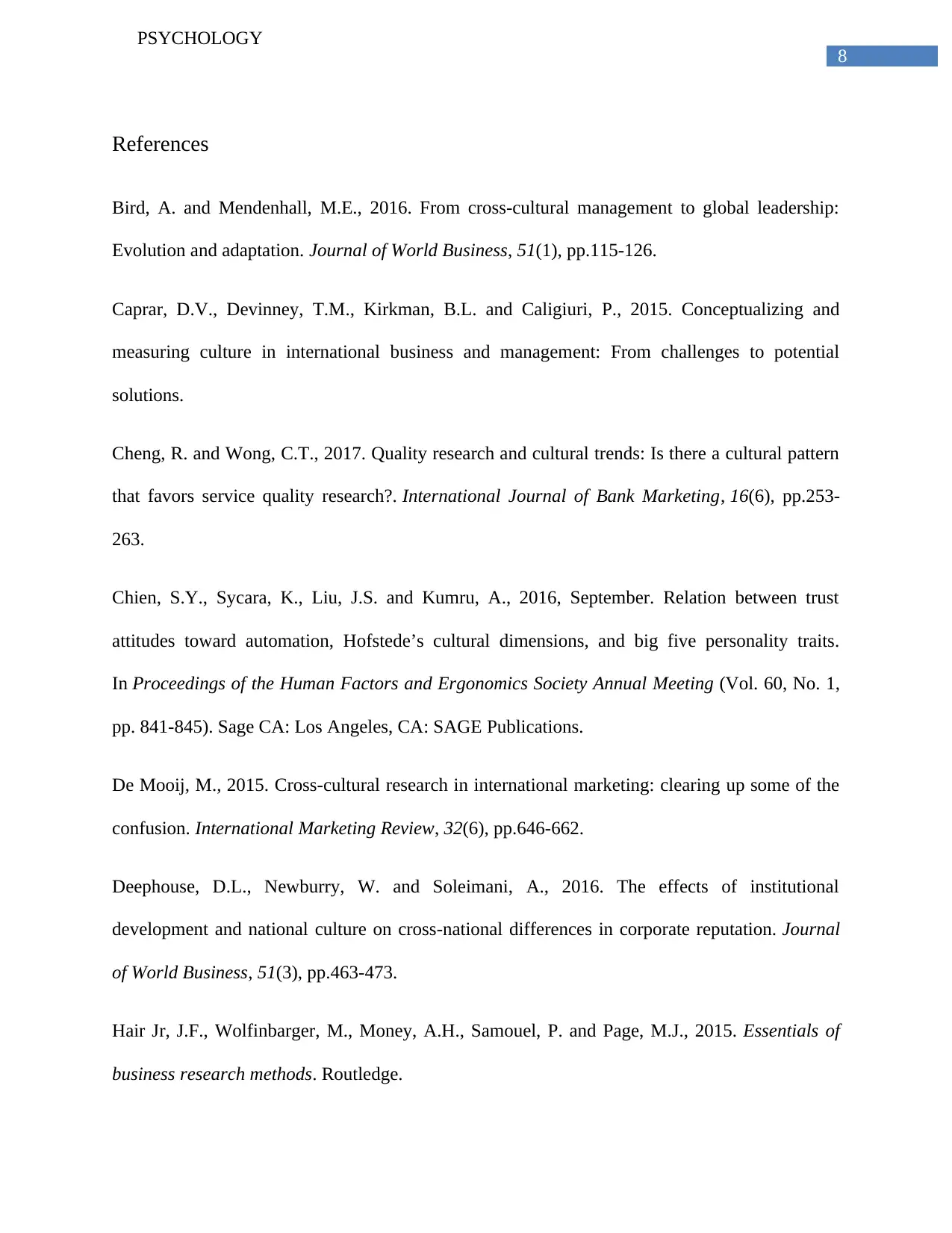
8
PSYCHOLOGY
References
Bird, A. and Mendenhall, M.E., 2016. From cross-cultural management to global leadership:
Evolution and adaptation. Journal of World Business, 51(1), pp.115-126.
Caprar, D.V., Devinney, T.M., Kirkman, B.L. and Caligiuri, P., 2015. Conceptualizing and
measuring culture in international business and management: From challenges to potential
solutions.
Cheng, R. and Wong, C.T., 2017. Quality research and cultural trends: Is there a cultural pattern
that favors service quality research?. International Journal of Bank Marketing, 16(6), pp.253-
263.
Chien, S.Y., Sycara, K., Liu, J.S. and Kumru, A., 2016, September. Relation between trust
attitudes toward automation, Hofstede’s cultural dimensions, and big five personality traits.
In Proceedings of the Human Factors and Ergonomics Society Annual Meeting (Vol. 60, No. 1,
pp. 841-845). Sage CA: Los Angeles, CA: SAGE Publications.
De Mooij, M., 2015. Cross-cultural research in international marketing: clearing up some of the
confusion. International Marketing Review, 32(6), pp.646-662.
Deephouse, D.L., Newburry, W. and Soleimani, A., 2016. The effects of institutional
development and national culture on cross-national differences in corporate reputation. Journal
of World Business, 51(3), pp.463-473.
Hair Jr, J.F., Wolfinbarger, M., Money, A.H., Samouel, P. and Page, M.J., 2015. Essentials of
business research methods. Routledge.
PSYCHOLOGY
References
Bird, A. and Mendenhall, M.E., 2016. From cross-cultural management to global leadership:
Evolution and adaptation. Journal of World Business, 51(1), pp.115-126.
Caprar, D.V., Devinney, T.M., Kirkman, B.L. and Caligiuri, P., 2015. Conceptualizing and
measuring culture in international business and management: From challenges to potential
solutions.
Cheng, R. and Wong, C.T., 2017. Quality research and cultural trends: Is there a cultural pattern
that favors service quality research?. International Journal of Bank Marketing, 16(6), pp.253-
263.
Chien, S.Y., Sycara, K., Liu, J.S. and Kumru, A., 2016, September. Relation between trust
attitudes toward automation, Hofstede’s cultural dimensions, and big five personality traits.
In Proceedings of the Human Factors and Ergonomics Society Annual Meeting (Vol. 60, No. 1,
pp. 841-845). Sage CA: Los Angeles, CA: SAGE Publications.
De Mooij, M., 2015. Cross-cultural research in international marketing: clearing up some of the
confusion. International Marketing Review, 32(6), pp.646-662.
Deephouse, D.L., Newburry, W. and Soleimani, A., 2016. The effects of institutional
development and national culture on cross-national differences in corporate reputation. Journal
of World Business, 51(3), pp.463-473.
Hair Jr, J.F., Wolfinbarger, M., Money, A.H., Samouel, P. and Page, M.J., 2015. Essentials of
business research methods. Routledge.
⊘ This is a preview!⊘
Do you want full access?
Subscribe today to unlock all pages.

Trusted by 1+ million students worldwide
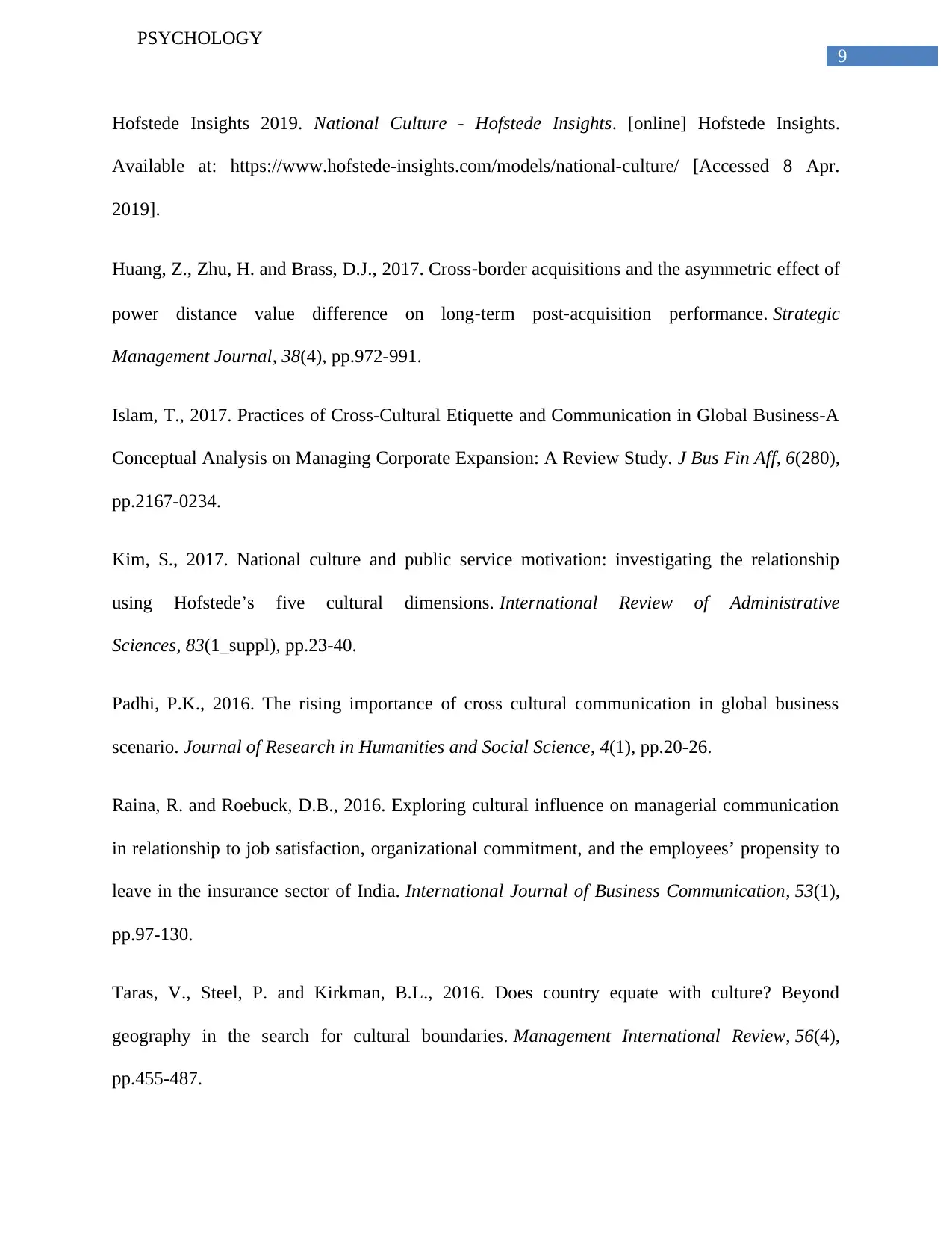
9
PSYCHOLOGY
Hofstede Insights 2019. National Culture - Hofstede Insights. [online] Hofstede Insights.
Available at: https://www.hofstede-insights.com/models/national-culture/ [Accessed 8 Apr.
2019].
Huang, Z., Zhu, H. and Brass, D.J., 2017. Cross‐border acquisitions and the asymmetric effect of
power distance value difference on long‐term post‐acquisition performance. Strategic
Management Journal, 38(4), pp.972-991.
Islam, T., 2017. Practices of Cross-Cultural Etiquette and Communication in Global Business-A
Conceptual Analysis on Managing Corporate Expansion: A Review Study. J Bus Fin Aff, 6(280),
pp.2167-0234.
Kim, S., 2017. National culture and public service motivation: investigating the relationship
using Hofstede’s five cultural dimensions. International Review of Administrative
Sciences, 83(1_suppl), pp.23-40.
Padhi, P.K., 2016. The rising importance of cross cultural communication in global business
scenario. Journal of Research in Humanities and Social Science, 4(1), pp.20-26.
Raina, R. and Roebuck, D.B., 2016. Exploring cultural influence on managerial communication
in relationship to job satisfaction, organizational commitment, and the employees’ propensity to
leave in the insurance sector of India. International Journal of Business Communication, 53(1),
pp.97-130.
Taras, V., Steel, P. and Kirkman, B.L., 2016. Does country equate with culture? Beyond
geography in the search for cultural boundaries. Management International Review, 56(4),
pp.455-487.
PSYCHOLOGY
Hofstede Insights 2019. National Culture - Hofstede Insights. [online] Hofstede Insights.
Available at: https://www.hofstede-insights.com/models/national-culture/ [Accessed 8 Apr.
2019].
Huang, Z., Zhu, H. and Brass, D.J., 2017. Cross‐border acquisitions and the asymmetric effect of
power distance value difference on long‐term post‐acquisition performance. Strategic
Management Journal, 38(4), pp.972-991.
Islam, T., 2017. Practices of Cross-Cultural Etiquette and Communication in Global Business-A
Conceptual Analysis on Managing Corporate Expansion: A Review Study. J Bus Fin Aff, 6(280),
pp.2167-0234.
Kim, S., 2017. National culture and public service motivation: investigating the relationship
using Hofstede’s five cultural dimensions. International Review of Administrative
Sciences, 83(1_suppl), pp.23-40.
Padhi, P.K., 2016. The rising importance of cross cultural communication in global business
scenario. Journal of Research in Humanities and Social Science, 4(1), pp.20-26.
Raina, R. and Roebuck, D.B., 2016. Exploring cultural influence on managerial communication
in relationship to job satisfaction, organizational commitment, and the employees’ propensity to
leave in the insurance sector of India. International Journal of Business Communication, 53(1),
pp.97-130.
Taras, V., Steel, P. and Kirkman, B.L., 2016. Does country equate with culture? Beyond
geography in the search for cultural boundaries. Management International Review, 56(4),
pp.455-487.
Paraphrase This Document
Need a fresh take? Get an instant paraphrase of this document with our AI Paraphraser

10
PSYCHOLOGY
Vitell, S.J., King, R.A., Howie, K., Toti, J.F., Albert, L., Hidalgo, E.R. and Yacout, O., 2016.
Spirituality, moral identity, and consumer ethics: A multi-cultural study. Journal of business
ethics, 139(1), pp.147-160.
PSYCHOLOGY
Vitell, S.J., King, R.A., Howie, K., Toti, J.F., Albert, L., Hidalgo, E.R. and Yacout, O., 2016.
Spirituality, moral identity, and consumer ethics: A multi-cultural study. Journal of business
ethics, 139(1), pp.147-160.
1 out of 11
Related Documents
Your All-in-One AI-Powered Toolkit for Academic Success.
+13062052269
info@desklib.com
Available 24*7 on WhatsApp / Email
![[object Object]](/_next/static/media/star-bottom.7253800d.svg)
Unlock your academic potential
Copyright © 2020–2026 A2Z Services. All Rights Reserved. Developed and managed by ZUCOL.





